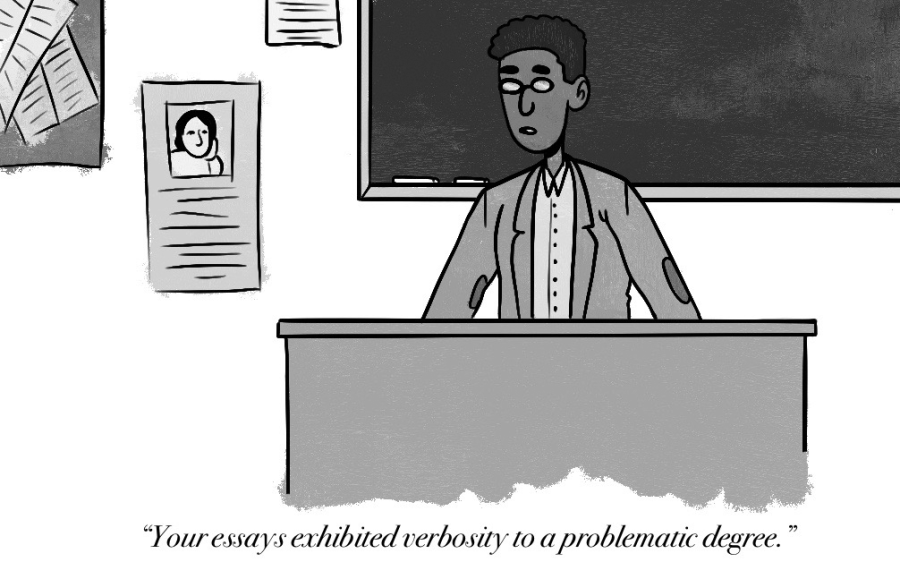Lavish Language
January 20, 2022
In his famous 1946 essay “Politics and the English Language,” Eric Arthur Blair—better known by his pen name George Orwell— condemned the imprecision of modern English. He argued that vagueness in political writing and speaking obscures the true thoughts of an author to the audience, erasing useful and interesting arguments while disguising bad ones. These habits of ambiguity and pretension in language lead to a less informed society—one in which a writer “turns as it were instinctively to long words and exhausted idioms, like a cuttlefish spurting out ink,” Orwell said.
Although we currently live some seven decades later than the author, Orwell’s analysis of language seems to still hold truth. In our media, certain newspapers, television shows and movies are famous for their overly complicated writing: They force readers to labor through a series of unnecessary polysyllabic words, French sayings and Latin phrases before uncovering any real meaning. Political commentators use cunning rhetoric instead of substantive facts to argue for their positions; the candidates they support participate in televised debates on platitudes and patriotism alone, failing to speak a single word about real policies. Cliches delivered in charismatic tones become substitutes for meaningful interaction, and the conversations between voters and politicians become worse in the process.
We also see Orwell’s ideas in our academic pursuits. While writing papers and participating in class discussions, we hide behind vague language after running out of arguments to make and insights to explain. To conceal our simple analysis or increase our page count, words like “because” become “due to the intrinsic and unavoidable fact that,” and where phrases like “I believe” would suffice, we use “I have now come to the conclusion that,” or, in Orwell’s mocking words, “In my opinion it is not an unjustifiable assumption that.” As we consider the real-world implications of different subjects in school, phrases like these become deceptive—a trick to make our audience think we are more insightful and intelligent than we really are. Importantly, we do not communicate like this in most cases because we need to—unlike the way, for example, we lean on scientific jargon in scientific lab reports—but because we choose to. Instead of turning our thoughts into carefully constructed sentences, we pollute our language by pretending that our meaningless extra words represent true facts or serious opinions.
Thinking about how language functions in everyday life, though, is much more important than just memorizing a few grammatical and stylistic rules. The classic conventions we learn about in middle school textbooks—using the active voice over the passive whenever possible, starting sentences with the subject and not the verb, ending independent clauses with a semicolon—should only be guides to us. If we view words as an important expression of our thoughts, after all, their simplicity becomes essential to our interactions with others: We must transfer our valuable ideas in the clearest way possible—not covered in any fancy double meanings, dramatic metaphors or obscure and pretentious grammar. On the other hand, if we need to make an argument on an issue we know little about, it is more honest to communicate with our audience in simple terms rather than confusing them with series of complex sentences. In both cases, concise wording carries weight by maintaining integrity rather than obscurity and deceit.
If we can still see the problems Orwell warned us about 70 years ago, it is our responsibility to reflect on the ways in which we express ourselves. From the papers we write to the seconds-long conversations we have in the hallways to the speeches we craft for debate and public speaking, we must make sure that the words we use are as direct and accessible as possible. When we know the language of others is insincere, moreover, we should feel compelled to remind them that honesty––not pomp or rhetoric––is the most important part of communication. Taking these actions will create a culture that values substance and curiosity above all else, one in which we determine quality of thought not by the author’s perceived intelligence but only by the argument itself.







































Jocelyn Medawar • Jan 27, 2022 at 7:12 pm
Thank you for this important piece! Earnest young writers-and some old ones–can confuse the effort to sound smart with the effort to be smart. It’s sometimes easier to have more faith in the thesaurus than in our own thinking. We all have different writing voices that we’ve mastered–an email to a teacher looks different from a text to a friend. At some point, those voices were learned and practiced in order to communicate effectively with different groups of people in our lives. Dear students, if you’re planning on going to college and maybe grad school, you’ll be in an academic arena producing academic work for a long time. High school is a good time to find your own academic writing voice, one that is smart, natural, and welcoming, not ornate, stiffly formal, and off-putting. Start by reading. Read the fiction you’re assigned and some fiction you’re not assigned. Read reputable newspapers and magazines. Read inside and outside your comfort zone. Use even the smallest writing assignment as a chance to hone and craft your sentences. The process can only make your thinking and writing more complex , persuasive, and, ultimately, uniquely yours.